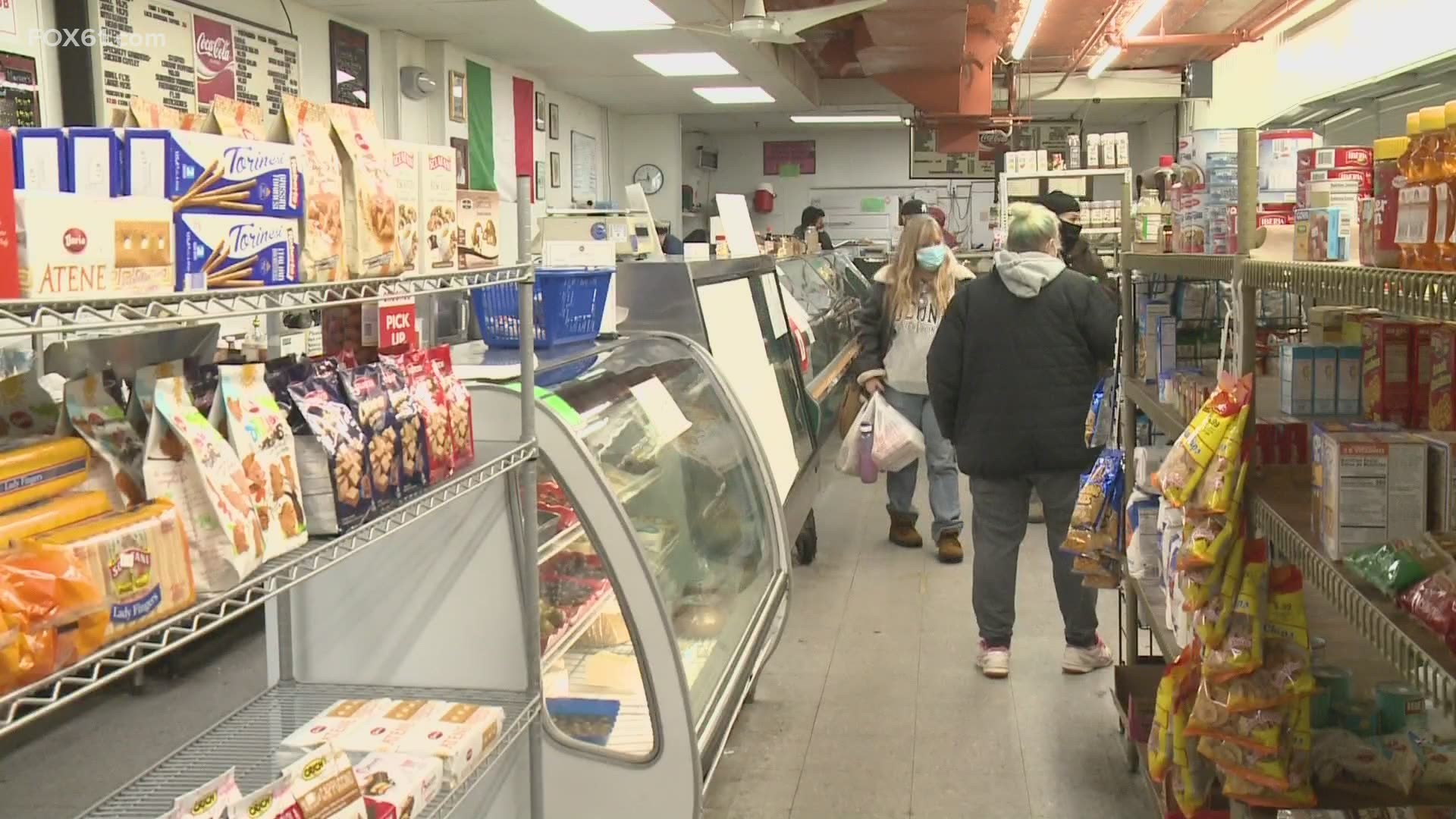MIDDLETOWN, Conn. — COVID-19 has contributed to the deaths of thousands of people in Connecticut. But how many businesses it has killed will not likely be known until at least the end of this year, some small business owners believe.
The Public Market, on Main Street in Middletown, has served the community since 1915. But Wednesday, they close their doors for good largely because one segment of their business vanished.
"They have the best Italian sweet sausage that you can find," said Beverley (Russo) Skinnon, a Middletown native, who made the trip over from Southington. "It's (sausage) as close to my mom's as it gets."
She said she heard about the closing this week and had to make one final trip.
"I’ve had people break down and start crying right here in front of me," said Joshua Morris, the owner of the Public Market. "It’s tough. It’s tough because some of the people come here three times a day at breakfast, lunch, and dinner."
Almost no catering business for a year ultimately cooked this neighborhood gathering spot.
"We did a lot of local corporate catering like the hospital, Community Health Center, Middlesex Community College, University of New Haven," Morris said, rattling off a few of his corporate customers.
Newington's Modern Edge Salon is day to day, hanging on by a hair.
"We’ve had to make some sacrifices," said Daniel Nascimento, the owner of Modern Edge Salon. "So not only cutting back on it or some of the expenditures we’ve had for daily operations. But we’ve had to sell some personal belongings, including, but not limited to, a vehicle I just to kind of make it through this."
With appointment cancellations and weddings and proms virtually non-existent, they've applied for any federal assistance available.
"I’m bitter and I’m upset with how they handled it," said Nascimento of the federal government. "I felt like it was oh no we will take care of you but in all reality, it was a fraction of what it needs to be."
$35,000 in grants and loans have kept the Pan del Cielo bakery in New Haven viable, for now.
"Without it, we would not be able to survive because when we opened, everything was slow," said Bryan Mera, co-owner of Pan del Cielo. "People are still scared to come out."
U.S. Senator Richard Blumenthal (D-Connecticut) visited the small Fair Haven bakery Tuesday, noting a new relief measure could pass soon that will permit Paycheck Protection Program money to be used for more than employees' salaries.
"All of the stuff that needs to be done that includes safety, but also utilities, rent, a much broader set of expense," said Blumenthal.
The COVID-19 Emergency Relief Package enacted on December 27, 2020, includes the following forms of support for small businesses:
Paycheck Protection Program (PPP)
- Second loans of up to $2 million for businesses that employ no more than 300 employees, demonstrate a loss of 25% of gross receipts in any quarter during 2020 (compared to the same quarter in 2019) and have used the full amount of their first PPP loan before a second loan is disbursed.
- Simplified loan forgiveness for loans of up to $150,000.
- Larger loan amounts for restaurant and hospitality businesses—3.5 times average total monthly payroll, rather than 2.5 times.
- Eligibility expansion to include certain local newspapers, TV and radio stations, public broadcasters, housing cooperatives, and 501(c)(6) nonprofits.
- Lender set-asides for mission-based lenders (such as Community Development Financial Institutions and Minority Depository Institutions) and smaller depository institutions (such as credit unions and farm credit institutions).
- Borrower set-asides for borrowers who were unable to apply for an initial PPP loan.
- Repeal of EIDL Advance restriction requiring borrowers to subtract the amount of their EIDL Advance from their PPP loan forgiveness amount.
Economic Injury Disaster Loan (EIDL) Advance
- Additional EIDL Advance funding for entities in low-income communities that previously received EIDL Advance grants of less than $10,000.
- $10,000 EIDL Advance grants for eligible applicants in low-income communities that did not previously secure EIDL Advance grants because funding had run out.
Grant Program for Shuttered Industries
- Grants of up to $10 million for eligible live venues, independent movie theaters, and other cultural institutions that can demonstrate a revenue loss of 25%. Grants can be used to cover expenses such as payroll costs, rent, utilities, and personal protective equipment.
- Borrower set-aside for entities with 50 or fewer employees.
SBA Debt Relief
- Relief from principal and interest payments for existing and new borrowers in SBA’s 7(a), 504, and microloan programs. Existing borrowers will receive three months of principal and interest, starting in February 2021, capped at $9,000 per month. Underserved borrowers, namely the smallest and hardest-hit, will receive an additional five months (eight total) of relief. New borrowers (loans approved between February 1 and September 30, 2021) will receive six months of relief.
SBA Core Loan Programs
- Improved loan affordability in SBA’s 7(a), Community Advantage, 504, and Microloan programs. Measures include increasing the 7(a) guarantee to 90%, waiving borrower and lender fees on 7(a) and 504 loans, enhancing 504 refinance options, and giving Microloan borrowers an extra two years for repayment.
Minority Business Development Agency
- Funding for the Minority Business Development Center program to help minority business enterprises (MBEs) respond to COVID-19, including by helping them identify and access local, State, or Federal government assistance.
Tax Relief
- Employee Retention Tax Credit (ERTC) extended through June 30, 2021. Eligibility expanded by reducing the required decline in gross receipts from 50% to 20%. Credit amount increased by raising the credit rate from 50% to 70% and the limit on per-employee creditable wages from $10,000/year to $10,000/quarter.
- Clarification of non-taxable small business assistance—PPP forgiven loans, EIDL Advance grants, certain loan repayment assistance, and grants for shuttered industries are not taxable as income. Furthermore, tax deductions are allowed for otherwise deductible expenses paid with the proceeds of these forms of small business assistance.

